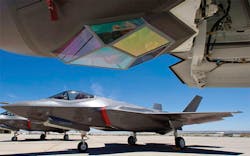IBC Engineered Materials Division, an investment caster in Wilmington, MA, will continue to supply beryllium-aluminum alloy azimuth gimbal housings to Lockheed Martin Corp. for its construction of F-35 Lightning II Joint Strike Fighter aircraft, following a recent three-year contract announced by parent company IBC Advanced Alloys Corp. The housings are part of the Stealth fighter’s Electro-Optical Targeting System (EOTS).
IBC Engineered Materials has been supplying the castings since 2015. The new $7.8-million, three-year contract represents the first time that Lockheed has awarded a multi-year purchase order for this critical component.
Lockheed is currently producing Lot 11 of the F-35 program, which is expected to total about 135 aircraft. Meanwhile, Lockheed has instructed its suppliers to begin producing for Lots 12, 13, and 14. The Dept. of Defense and international program partners are expected to acquire at least 440 F-35s over the coming three-year period.
More than 280 aircraft have been delivered to date, with approximately 3,000 F-35s expected to be produced over the life of the program.
The EOTS is a lightweight, multi-function package for air-to-air and air-to-surface targeting capability on the single-engine F-35. It combines advanced sensor technology, a low-profile sapphire window design, and advanced algorithms to provide long-range target recognition, identification, and tracking.
The azimuth gimbal housings will be made of IBC’s high-performance beryllium-aluminum alloy known as Beralcast® — a “high-modulus alloy” that is said to be three times stiffer and 22% lighter than aluminum, and can be investment cast as simple or complex parts with precision. Beryllium-aluminum alloys allow the system to acquire targets at longer distances than would be the case with other materials, according to IBC, and help to dampen vibration and signal noise, which enhances the electro-optical resolution range.
Also, IBC explained that its casting technology gives it the ability to produce beryllium-aluminum parts at significantly less cost “than legacy production techniques.”
“IBC’s proprietary casting process stands alone when it comes to delivering stiff, light, and reliable parts for modern aircraft imaging systems,” stated Chris Huskamp, president of the IBC Engineered Materials Division. “Our net-shape casting process represents a significant cost advantage when compared to traditional machining of consolidated powder billets. Our recent investments in new capital equipment and personnel have strategically positioned us to support the increased volumes for Lockheed with exceptional cost competitiveness.”
About the Author
Robert Brooks
Content Director
Robert Brooks has been a business-to-business reporter, writer, editor, and columnist for more than 20 years, specializing in the primary metal and basic manufacturing industries. His work has covered a wide range of topics, including process technology, resource development, material selection, product design, workforce development, and industrial market strategies, among others.
